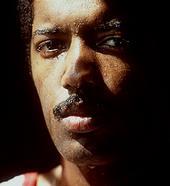Raymond Lewis is considered by many to be one of the greatest basketball players that ever lived, and certainly without exception the best ever to come out of Los Angeles.
Lewis, a 6-foot-1-inch, cat-quick guard with unlimited shooting range attended Verbum Dei high school in the early seventies and led his team to an 84-4 winning record and three consecutive California Interscholastic Federation (CIF) titles in 69' 70' and 71'. He was named CIF player of the year twice, as a junior then as a senior.
He would go on to bomb a group of LA Lakers for 52 points while still in high school. Lewis was offered 250 college basketball scholarships nationwide before deciding to attend Cal State L.A. As a freshman he set all kinds of scoring records and averaged 38.9 points per game and shot nearly 60 percent from the floor, an incredible feat for a guard who rarely shoots inside of 20 feet.
In two CSLA weekend preliminary games Lewis once scored 50 points against San Diego State and the very next day scored an all time high of 73 points against UC Santa Barbara hitting 30 of 40 shots (75% fgp) and adding 13 free throws for a 103-88 win over the Gauchos.
For the two day back-to-back games, Lewis scored 123 points making an eye popping 52 of 84 field goals (62%fgp) and 19 free throws. (Games were played before the insertion of the 3-point shot!)
As a sophomore, the Lewis led CSLA basketball team upset the number three-ranked Long Beach State 49ers coached by the legendary Jerry Tarkanian. Lewis scored 53 points in the double overtime thriller. He was the NCAA's second leading scorer as a sophomore averaging 32.9 points per game. Four of the five players from that Long Beach State team would go on to play in the NBA.
During his era, Lewis was the youngest player ever drafted and signed by the NBA. He was the 18th player taken in the first round by the Philadelphia 76ers. The Sixers and NBA's number one draft choice that year was Doug Collins of Illinois State. In the teams full-court scrimmage, Lewis reportedly scored 60 points against Collins by half-time. The Sixers then signed Collins to a million dollar contract, which at that time made him one of the highest paid players in the NBA.
By all accounts, Lewis had a spectacular rookie camp, outplaying Collins. Soon a bitter contract dispute between Lewis and the Sixers took place. Sixers management said Lewis then walked out of camp. Lewis says he was told by the Sixer organization to sit out a year and mature. Later, In 1974 Lewis jumped to the ABA where he all but made the Utah Stars (Now the NBA's Utah Jazz) basketball team.
However, Philadelphia notified Utah that they risked a lawsuit if they signed Lewis since he was under contract with the 76ers. The Stars gave in to the Sixers demand ending Lewis' pro career. He would later try out for other NBA teams sometimes averaging over 50 points a game but no team would sign him. Many people, including Lewis felt he was being blackballed from playing professional baketball.
Lewis would then take out his frustrations on basketball courts throughout California. No high school, junior college, University or playground was safe from Lewis' scoring binges. He averaged 54 points a game in the 1981 highly-regarded summer league games which featured many NBA players. In 1983 he would then go on to score 81 points in another. In a single day, he played the top 30 streetballers in LA and won all 30 games.
On June 6, 2006 former NBA LA Lakers defensive star Michael Cooper told ESPN radio personality Colin Cowherd that Lewis once scored 60 points on him in a summer pro league game in only three quarters of play.
A subject of numerous articles, Lewis has been featured in Sports Illustrated, Slam Magazine, The Book "Runnin' Rebel" etc. Regardless of the contract dispute the NBA lost one of it's greatest players, the world lost more. Raymond Lewis is no longer with us, but his legend will live on forever!
To read what former NBA players, college coaches and streetballers have to say about this phenomenal basketball player, simply visit our website at www.raymondlewis.com
